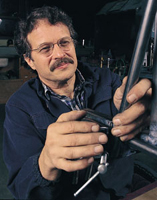| |
|||||
|
Wheelchair activist to receive President's Medal | ||||
|
May 17, 2005 |
|||||
 Twenty
million disabled people in developing countries around the world need
wheelchairs. "But only 2 percent have them," says Ralf Hotchkiss,
co-founder and chief engineer of Whirlwind Wheelchair International (WWI)
based at SFSU's Urban Institute. Twenty-five years ago, when Hotchkiss
began
helping
Third-World
populations to build wheelchairs, it was less than 1 percent. Twenty
million disabled people in developing countries around the world need
wheelchairs. "But only 2 percent have them," says Ralf Hotchkiss,
co-founder and chief engineer of Whirlwind Wheelchair International (WWI)
based at SFSU's Urban Institute. Twenty-five years ago, when Hotchkiss
began
helping
Third-World
populations to build wheelchairs, it was less than 1 percent.
The fact that one man could make a difference in the lives of people all over the world is the reason why SFSU President Robert A. Corrigan recently selected Hotchkiss as the next recipient of the prestigious President's Medal. Corrigan will present Hotchkiss with the award at Commencement exercises on May 28 in Cox Stadium beginning at 12:15 p.m. "Ralf's work is an example of community service and civic engagement taken to a global level," Corrigan said. "He embodies many of the values we hold dear on our campus: access to opportunity and concern for the world around us." Hotchkiss trains local workers from developing countries and directs the building of suitable wheelchairs from locally available materials. He began his quest for more and better wheelchairs in 1980 in Nicaragua where he had volunteered to lead a group of locals in the repair of donated chairs. "The donated chairs were in bad shape and not very maneuverable on unpaved surfaces," he recalls. "And one of the Nicaraguans said, 'We could probably build better chairs from scratch.'" Hotchkiss founded WWI in 1989 with SFSU engineering Professor Peter Pfaelzer. Since then, WWI has trained more than 500 people from 50 countries in Latin America, Africa, Asia, India and Afghanistan. Hotchkiss was a musician, Merit Scholar and winner of a Westinghouse Science Talent award for his invention of electronic "glasses" for the blind by the time he graduated high school in Rockford, Ill., in 1965. A year later, the young man whose dream it was to design devices that would make life easier for people with disabilities, found himself permanently confined to a wheelchair after a motorcycle accident. He began his wheelchair activism shortly after graduating from Oberlin College as an advisor to Ralph Nader as one of the Nader's Raiders. Now 57 years old, the Oakland resident says, "In a way, it was lucky that I became disabled ... as a wheelchair user myself, it makes my designs so much more effective." Hotchkiss recently returned from Universidad del Valle in Cali, Colombia, where he taught Engineering 620, the wheelchair engineering class he's taught at SFSU since 1989. WWI hopes to forge a broader collaboration with the Engineering Department at that university to include their help in a campaign for the adoption of wheelchair safety standards in developing countries. Two days after Hotchkiss receives the President's Medal, he will make his first trip to Afghanistan to further close the gap between those who need wheelchairs and those who have them. No stranger to awards and accolades, Hotchkiss is a 1989 MacArthur "genius award" recipient and was honored late last year by Silicon Valley's Tech Museum for "inventions and innovations in technology that benefit humanity." Previous SFSU President's Medal awardees include U.S. Sen. Dianne Feinstein; philanthropist Richard Goldman; actress Annette Bening; author Ernest Gaines and former San Francisco Mayor Willie Brown.
|
|||||
 |
1600 Holloway Avenue, San Francisco, CA 94132 (415) 338-1111 |